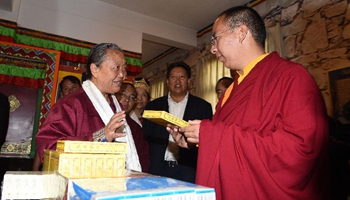LA PAZ, Aug. 28 (Xinhua) -- A Bolivian judge on Sunday ordered the preventive detention of six opposition miners following the lynching earlier this week of the deputy minister of mining.
Among the six miners jailed was the leader of the anti-government mining movement "whose members on Thursday tortured and assassinated the deputy minister ... Rodolfo Illanes," the state Bolivian News Agency (ABI) said.
"Following an exhaustive investigation, prosecutors determined the accused participated in the death of the deputy minister, in some cases by taking part and in others by complicity," prosecutor Edwin Blanco said.
Bolivia's National Federation of Mining Cooperatives (Fencomin), headed by Carlos Mamani Copa, had launched violent protests to get the government to meet some 10 demands, including being allowed to sign contracts with private mining firms -- Bolivia's energy sector is nationalized -- and wanting the government to supply them with free electricity.
Illanes had gone to speak with the miners, after four miners had been killed and another 10 arrested.
According to officials, some 100 miners "forced him to climb a hill on his knees until they were fractured, before stoning him to death."
The miners had also laid a trap with explosives in case police arrived at the site.
From 2003 to 2013, mining in Bolivia generated some 880 million dollars in royalties for mining regions, far less than the 6.13 billion dollars in royalties from gas and oil production, according to government figures.
Nevertheless, the mining cooperatives have benefited greatly from government programs in the past decade, Guido Mitma, the executive secretary of the Bolivian Workers' Central (COB), told a local daily recently.
"The cooperatives were the most preferred sector. They were given benefits and priorities (and) that has made them a powerful sector that can confront the government. There are more than 200,000 cooperative members, who when mobilized can create a big problem," said Mitma.
Some 100,000 miners are affiliated with the Fencomin.
While the cooperative members don't have to pay tax on profits, they also receive no worker's benefits from the government.










